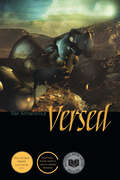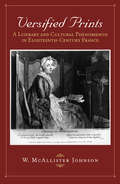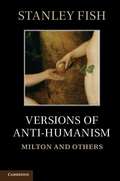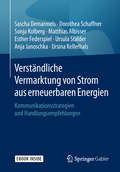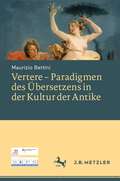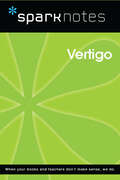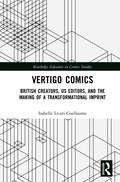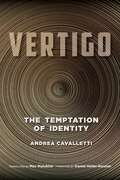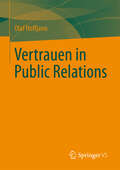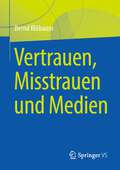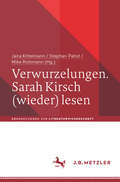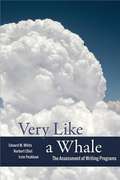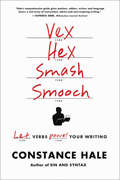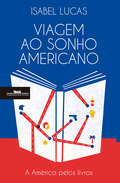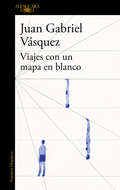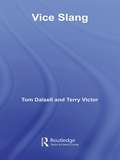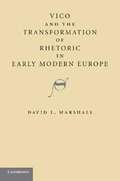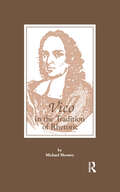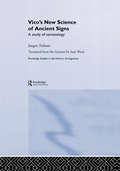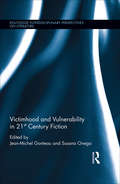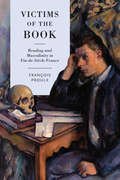- Table View
- List View
Versed (Wesleyan Poetry Series)
by Rae ArmantroutWinner of the 2010 Pulitzer Prize for PoetryWinner of the Pulitzer Prize for Poetry (2010)Winner of the National Book Critics Circle Award (2009) Rae Armantrout has always organized her collections of poetry as though they were works in themselves. Versed brings two of these sequences together, offering readers an expanded view of the arc of her writing. The poems in the first section, Versed, play with vice and versa, the perversity of human consciousness. They flirt with error and delusion, skating on a thin ice that inevitably cracks: "Metaphor forms / a crust / beneath which / the crevasse of each experience." Dark Matter, the second section, alludes to more than the unseen substance thought to make up the majority of mass in the universe. The invisible and unknowable are confronted directly as Armantrout's experience with cancer marks these poems with a new austerity, shot through with her signature wit and stark unsentimental thinking. Together, the poems of Versed part us from our assumptions about reality, revealing the gaps and fissures in our emotional and linguistic constructs, showing us ourselves where we are most exposed. A reader's companion is available at http://versedreader.site.wesleyan.edu/
Versified Prints
by W. Mcallister JohnsonThe term 'versified prints' is used to describe images that are accompanied by poetic explanatory text. They were immensely popular and diffused throughout Europe in the eighteenth century, and many were shown at the Salon du Louvre. Although not all print verses are signed, their authors include occasional poets and members of the Académie Française. These prints remain among the most accessible documents for the study of art and society, but have never been examined before for their historical and cultural context.With 112 full-page reproductions, Versified Prints offers an engaging and informative introduction to these intriguing works. W. McAllister Johnson's guide discusses print production, the nature of sources, and the relationship and transformations in both text and images. Proposing a typology and methodology for this artistic phenomenon, Versified Prints enhances our knowledge of this fascinating new area of research and lays the groundwork for future studies. Disclaimer: Images removed at the request of the rights holder.
Versions of Antihumanism: Milton and Others
by Stanley FishStanley Fish, one of the foremost critics of literature working today, has spent much of his career writing and thinking about Milton. This book brings together his finest published work with brand new material on Milton and on other authors and topics in early modern literature. In his analyses of Renaissance texts, he meditates on the interpretive problems that confront readers and offers a sustained critique of historicist methods of interpretation. Intention, he argues, is key to understanding which pieces of historical data are relevant to literary criticism. Lucid, provocative, direct and inimitable, this new book from Stanley Fish is required reading for anyone teaching or studying Milton and early modern literary studies.
Verständliche Vermarktung von Strom aus erneuerbaren Energien
by Sascha Demarmels Dorothea Schaffner Sonja Kolberg Matthias Albisser Esther Federspiel Ursula Stalder Anja Janoschka Ursina KellerhalsDieses Buch untersucht, wie sich Stromprodukte aus erneuerbaren Energien verständlich vermarkten lassen, sodass die Konsumentinnen und Konsumenten den Mehrwert dieser Produkte verstehen und eine informierte Kaufentscheidung treffen. Eine Toolbox liefert Handlungsempfehlungen und erläutert Kommunikationsstrategien wie Gamification, Storytelling, Vereinfachung und Visualisierung. Basis der Handlungsempfehlungen sind Experteninterviews, in Experimenten getestete Pilotbeispiele sowie von Partnerunternehmen entwickelte Kommunikationsbeispiele, die in der Praxis umgesetzt und als Feldexperiment geprüft wurden.Der InhaltStrommarkt und -marketing in den DACH LändernForschungsstand "Angewandte Verständlichkeit"Kommunikationsstrategien zur Steigerung der Verarbeitungsmotivation und deren ValidierungBest-Practice-Beispiele aus verschiedenen Ländern Toolbox.
Vertere – Paradigmen des Übersetzens in der Kultur der Antike
by Maurizio BettiniMaurizio Bettinis Buch schildert die Praktiken und Paradigmen des Übersetzens in der griechischen und römischen Antike bis hin zu den Bibelübersetzungen des hellenistischen Judentums und der christlichen Spätantike. Es ist zugleich eine materialreiche historische Studie und ein kluger Essay über die Dimensionen des Übersetzens als Akt der kreativen Aneignung des Fremden. Im Kontrast zum modernen „postkolonialen“ Übersetzungsverständnis – das letztlich auf die monotheistische Schrift-Übersetzung zurückgeht – versteht Bettini die Übersetzungspraxis der Antike als Teil einer Kultur der sprachlich-literarischen Umwandlung, als Akt des (Nach-) Erzählens, zugleich auch als ein der Ökonomie des (sprach-)grenzüberschreitenden Austauschs verpflichtetes Handeln.
Vertigo (SparkNotes Film Guide)
by SparkNotesVertigo (SparkNotes Film Guide) Making the reading experience fun! SparkNotes Film Guides are one-stop guides to great works of film–masterpieces that are the foundations of filmmaking and film studies. Inside each guide you&’ll find thorough, insightful overviews of films from a variety of genres, styles, and time periods. Each film guide contains:Information about the director and the context in which the film was made Thoughtful analysis of major characters Details about themes, motifs, and symbols Explanations of the most important lines of dialogue In-depth discussions about what makes a film so remarkable SparkNotes Film Guides are an invaluable resource for students or anyone who wants to gain a deeper understanding of the great films they know and love.
Vertigo Comics: British Creators, US Editors, and the Making of a Transformational Imprint (Routledge Advances in Comics Studies)
by Isabelle Licari-GuillaumeThis book explores the so-called "British Invasion" of DC Comics’ Vertigo imprint, which played an important role in redefining the mainstream comics industry in the US during the early 1990s. Focusing on British creators within Vertigo, this study traces the evolution of the line from its creation in 1993 to its demise in 2019. Through an approach grounded in cultural history, the book disentangles the imprint’s complex roots, showing how editors channelled the potential of its British writers at a time of deep-seated economic and cultural change within the comics industry, and promoted a sense of cohesion across titles that defied categories. The author also delves into lesser-known aspects of the Invasion, exploring less-canonical periods and creators that are often eclipsed by Vertigo’s early star writers. An innovative contribution on a key element of comic book history, this volume will appeal both to researchers of Vertigo scholarship and to fans of the imprint. It will also be an essential read for those interested in transatlantic collaborations and exchanges in the entertainment industry, processes of cultural legitimation and cultural hierarchies, and to anyone working on the representation of national and social identities.
Vertigo: The Temptation of Identity
by Andrea CavallettiReading philosophy through the lens of Alfred Hitchcock’s Vertigo, Andrea Cavalletti shows why, for two centuries, major philosophers have come to think of vertigo as intrinsically part of philosophy itself.Fear of the void, terror of heights: everyone knows what acrophobia is, and many suffer from it. Before Freud, the so-called “sciences of the mind” reserved a place of honor for vertigo in the domain of mental pathologies. The fear of falling—which is also the fear of giving in to the temptation to let oneself fall—has long been understood as a destabilizing yet intoxicating element without which consciousness itself was inconceivable. Some went so far as to induce it in patients through frightening rotational therapies.In a less cruel but no less radical way, vertigo also staked its claim in philosophy. If Montaigne and Pascal could still consider it a perturbation of reason and a trick of the imagination which had to be subdued, subsequent thinkers stopped considering it an occasional imaginative instability to be overcome. It came, rather, to be seen as intrinsic to reason, such that identity manifests itself as tottering, kinetic, opaque and, indeed, vertiginous.Andrea Cavalletti’s stunning book sets this critique of stable consciousness beside one of Hitchcock’s most famous thrillers, a drama of identity and its abysses. Hitchcock’s brilliant combination of a dolly and a zoom to recreate the effect of falling describes that double movement of “pushing away and bringing closer” which is the habitual condition of the subject and of intersubjectivity. To reach myself, I must see myself from the bottom of the abyss, with the eyes of another. Only then does my “here” flee down there and, from there, attract me.From classical medicine and from the role of imagination in our biopolitical world to the very heart of philosophy, from Hollywood to Heidegger’s “being-toward-death,” Cavalletti brings out the vertiginous nature of identity.
Vertrauen in Public Relations
by Olaf HoffjannPR ist für viele längst zum Inbegriff der scheinheiligen Lüge geworden. Zu Recht - wie die Greenwashing-Strategien von Energiekonzernen eindrucksvoll zu belegen scheinen. Oder tut man ihr doch Unrecht? Denn wie soll PR in einer Kontingenzgesellschaft noch Wahrhaftigkeit und Redlichkeit beweisen können? Dieses Spannungsfeld steht im Mittelpunkt des Buches: Im ersten Teil werden Vertrauen bzw. Vertrauenswürdigkeit als zentrale Kategorien der PR herausgearbeitet. Worin besteht das Vertrauen in PR? Wie wird Vertrauen in PR begründet? Im zweiten Teil wird untersucht, wie PR das Problem der Vertrauenswürdigkeit zwischen Lüge und Wahrhaftigkeit sowie zwischen egoistischem und selbstlosem Verhalten zu lösen versucht. Auf einer systemtheoretischen und non-dualistischen Basis wird eine Gratwanderung unternommen: Es soll weder ein Whitewashing noch eine Verdammung der PR betrieben werden. Und doch wird am Ende des Buches immer deutlicher, wie schwierig es für den "Ehrlichen" ist, die Öffentlichkeit von seiner Redlichkeit zu überzeugen - und welche Chancen genau darin für die "Unehrlichen" liegen.
Vertrauen, Misstrauen und Medien
by Bernd BlöbaumVertrauen ist im sozialen Leben und in der Gesellschaft eine wichtige Ressource und Produktivkraft. Das Buch beschreibt in einem konzeptionellen Teil wie sich Vertrauen entwickelt, wie es definiert werden kann und aus welchen Elementen sich ein Vertrauensprozess zusammensetzt. Vorgestellt werden ein Vertrauensmodell sowie Wege, Vertrauen und Misstrauen empirisch zu erforschen. Im empirischen Teil werden Daten aus eigenen repräsentativen Befragungen präsentiert. Dabei werden vertrauensvolle und misstrauische Menschen charakterisiert. Ausführlich werden Medien und Journalismus als Objekte von Vertrauen, Skepsis und Misstrauen behandelt. Dargestellt wird, welche Rolle Medien und Journalismus bei Vertrauen in Politik, Wissenschaft und Religion spielen, bevor bilanzierend reflektiert wird, wie Vertrauen geschaffen und Misstrauen vermieden werden kann.
Verwurzelungen. Sarah Kirsch (Abhandlungen zur Literaturwissenschaft)
by Jana Kittelmann Stephan Pabst Mike RottmannSarah Kirsch (1935-2013) zählt zu den bedeutendsten deutschsprachigen Dichterinnen. Erfolgreiche Lyrikbände wie „Zaubersprüche“ und „Erlkönigs Tochter", die Interviewsammlung „Die Pantherfrau“ oder die Erzählung „Allerlei-Rauh“ haben die gesamtdeutsche Literaturlandschaft nachhaltig beeinflusst. Kirsch hinterließ ein vielfältiges Werk, das neben Gedichten auch Briefwechsel, Tagebuchaufzeichnungen, Reiseberichte, Feuilletonbeiträge, kleinere Prosatexte, Übersetzungen, Zeichnungen und Aquarelle umfasst. Der Sammelband arbeitet mehr als zehn Jahre nach dem Tod der Dichterin die fortwährende Brisanz und Aktualität ihres Werks heraus, das von dem unverwechselbaren „Sarah-Sound" (Peter Hacks) ebenso geprägt ist wie von einer präzisen und zugleich visionären Wahrnehmung von Natur und deren Gefährdung.
Very Like a Whale
by Irvin Peckham Norbert Elliot Edward M. WhiteWritten for those who design, redesign, and assess writing programs, Very Like a Whale is an intensive discussion of writing program assessment issues. Taking its title from Hamlet, the book explores the multifaceted forces that shape writing programs and the central role these programs can and should play in defining college education.Given the new era of assessment in higher education, writing programs must provide valid evidence that they are serving students, instructors, administrators, alumni, accreditors, and policymakers. This book introduces new conceptualizations associated with assessment, making them clear and available to those in the profession of rhetoric and composition/writing studies. It also offers strategies that aid in gathering information about the relative success of a writing program in achieving its identified goals.Philosophically and historically aligned with quantitative approaches, White, Elliot, and Peckham use case study and best-practice scholarship to demonstrate the applicability of their innovative approach, termed Design for Assessment (DFA). Well grounded in assessment theory, Very Like a Whale will be of practical use to new and seasoned writing program administrators alike, as well as to any educator involved with the accreditation process.
Very Like a Whale: The Assessment of Writing Programs
by Irvin Peckham Norbert Elliot Edward M. WhiteWinner of the 2015 CPTSC Award for Excellence in Program Assessment Written for those who design, redesign, and assess writing programs, Very Like a Whale is an intensive discussion of writing program assessment issues. Taking its title from Hamlet, the book explores the multifaceted forces that shape writing programs and the central role these programs can and should play in defining college education. Given the new era of assessment in higher education, writing programs must provide valid evidence that they are serving students, instructors, administrators, alumni, accreditors, and policymakers. This book introduces new conceptualizations associated with assessment, making them clear and available to those in the profession of rhetoric and composition/writing studies. It also offers strategies that aid in gathering information about the relative success of a writing program in achieving its identified goals. Philosophically and historically aligned with quantitative approaches, White, Elliot, and Peckham use case study and best-practice scholarship to demonstrate the applicability of their innovative approach, termed Design for Assessment (DFA). Well grounded in assessment theory, Very Like a Whale will be of practical use to new and seasoned writing program administrators alike, as well as to any educator involved with the accreditation process.
Veteran Poetics: British Literature in the Age of Mass Warfare, 1790–2015
by Kate McLoughlinIn this first full-length study of the war veteran in literature, Kate McLoughlin draws new critical attention to a figure central to national life. Offering fresh readings of canonical and non-canonical works, she shows how authors from William Wordsworth to J. K. Rowling have deployed veterans to explore questions that are simultaneously personal, political, and philosophical: What does a community owe to those who serve it? What can be recovered from the past? Do people stay the same over time? Are there right times of life at which to do certain things? Is there value in experience? How can wisdom be shared? Veteran Poetics features veterans who travel in time, cause havoc with their reappearances, solve murders, refuse to stop talking about the wars they have been in, and refuse to say a word about them. Through this last trait, they also prompt consideration of possible critical responses to silence.
Vex, Hex, Smash, Smooch: Let Verbs Power Your Writing
by Constance HaleA writing handbook that celebrates the infinite pizzazz of verbs. Writers know it instinctively: Verbs make a sentence zing. Grammar gurus agree: Drama in writing emerges from the interplay of a subject (noun) and a predicate (verb). Constance Hale, the best-selling author of Sin and Syntax, zooms in on the colorful world of verbs. Synthesizing the pedagogical and the popular, the scholarly and the scandalous, Hale combines the wit of Bill Bryson with the practical wisdom of William Zinsser. She marches through linguistic history to paint a layered picture of our language--from before it really existed to the quirky usages we see online today. She warns about habits to avoid and inspires with samples of brilliant writing. A veteran teacher, Hale gives writing prompts along the way, helping readers "try, do, write, play." Vex, Hex, Smash, Smooch guides us to more powerful writing by demonstrating how to use great verbs with style.
Viagem ao sonho americano
by Isabel LucasUma viagem literária (e muito mais) pelos Estados Unidos da América, com Trump em pano de fundo. UM DOS MELHORES LIVROS DO ANO: Revista Visão * Comunidade Cultura e Arte * blogue literário Deus me livro O que é a América? Numa viagem pelo país que (ainda) é visto como o centro do mundo, Isabel Lucas sonda a condição americana, os seus mitos, paradoxos, medos e fragilidades, mas também a sua grandeza e capacidade de reinvenção. O ponto de partida para esta viagem foi a literatura, esse território onde ainda há lugar para questionar, desconstruir, reimaginar. Partiu de autores e obras de referência e explorou as suas geografias: a New Bedford de Moby Dick, a Newark de Philip Roth, o Texas de Cormac McCarthy, o Sul de Toni Morrison, o mapa da classe média de Richard Ford e John Updike, entre muitos outros. Nestes e noutros lugares, reais e imaginados, encontrou uma América que tem medo de se olhar nos olhos e outra América, a que quer olhar para dentro para se purgar dos males e avançar. Descobriu uma América que se fecha perante o desconhecido e outra América, a que vê na diferença a sua maior riqueza. Partindo dos livros, esta é também, inevitavelmente, uma viagem pelas ruas da América, pelas suas gentes, pelas vozes anónimas e pelos seus mitos, entre eles, o tal sonho fundador. Afinal, o que é o sonho americano? Será o sonho de um país ou o sonho de um mundo inteiro? Os elogios da crítica: «A propósito de sonho, não posso deixar de ressalvar, neste livro da Isabel, o privilégio de termos simultaneamente a repórter que nos descreve com argúcia e sensibilidade os muitos lugares de que se faz uma viagem de um ano e 97.000 quilómetros, a entrevistadora que nos revela os nossos semelhantes, iluminando-os, a critica literária que escolheu dezasseis obras fundamentais da literatura norte americana e depois acrescentou outras tantas, e finalmente a viajante aventureira.»Dulce Maria Cardoso «Nesta jornada intimista encontramos uma aventura de escrita pessoalíssima, ao mesmo tempo humana e intelectual.»José Mário Silva, Expresso «Jornalismo no seu melhor. Daquele que exige tempo, tempo para fazer e tempo para digerir.» Pedro Dias de Almeida, Visão «Apresenta a América de uma perspectiva muitíssimo original. O livro merece, a todos os títulos, figurar como uma das melhores e mais originais obras produzidas nos últimos anos em matéria de literatura de viagens.»António Araújo, Público «Este livro é um pedaço de grande literatura que merece ser amplamente lido e receber prémios.»Vasco Rosa, Observador «Um livro que está entre o jornalismo old school feito à séria e uma escrita perfumada e inspirada. Para o leitor, trata-se de um verdadeiro festim.»Pedro Miguel Silva, Deus me livro «Entre os melhores livros de não ficção do ano. A não perder.»Marco Alves, Sábado
Viajes con un mapa en blanco
by Juan Gabriel VásquezUna colección de ensayos sobre el arte de la novela, por el ganador del Premio IMPAC y el Premio Alfaguara de Novela. Los seres humanos, sostiene este libro, no hemos inventado la novela: es la novela la que nos ha inventado a nosotros. Pero ¿qué nos dan las novelas que no nos puede dar ninguna otra forma narrativa? ¿Qué lugar ocupan en nuestras vidas como individuos y como sociedades? ¿Por qué son, según Vásquez, una manera irremplazable de investigarnos a nosotros mismos, y cómo llevan a cabo sus sortilegios? De Cervantes a Conrad, de Tolstoi a Vargas Llosa, de Proust a Camus, estos ensayos proponen un elogio de ese género proteico y también, entre líneas, un lamento por su situación presente en un mundo que se le ha vuelto hostil. «Un novelista que escribe ensayos, y en particular si esos ensayos hablan del arte de la novela, es como un náufrago que manda coordenadas: quiere decirles a los demás cómo pueden encontrarlo. También, por supuesto, quiere encontrarse a sí mismo; en otras palabras, saber cómo debe leer las novelas que escribe. El ensayo es una exploración, una tentativa, una averiguación, y el novelista escribe para descubrir y trazar los límites de sus conocimientos y la forma de sus certezas. En ese sentido, podría decir uno, es un género confesional.»Juan Gabriel Vásquez Reseñas:«Juan Gabriel Vásquez lidera la generación de escritores que están reinventando la literatura latinoamericana para el siglo XXI.»Jonathan Franzen «Una de las voces más originales de la nueva literatura latinoamericana.»Mario Vargas Llosa «Un escritor superdotado [...]. Uno de los escritores mayores del mundo hispánico.»Thierry Clermont, Le Figaro «Uno de los escritores más grandes del mundo.»Andrea Bajani, La Repubblica «Vásquez es el novelista colombiano más erudito e inventivo de laactualidad.»Amanda Hopkinson, The Independent «Vásquez ha acumulado una obra impresionante, una de las más impactantes que hayan surgido en Latinoamérica en lo que va del siglo.»David Gallagher, The New York Review of Books «Vásquez es uno de los grandes autores de hoy, sin distinción de territorio.»Mathias Enard «Un maestro en el arte de estudiar las grietas y las existencias que toman por el camino equivocado [...]. Un escritor consumado que domina tanto las formas breves como la novela.»Livres Hebdo
Vice Slang
by Tom Dalzell Terry VictorAre you a bit of a chairwarmer? Do you use the wins from a country straight to get scudded on snakebite in a blind tiger? Do you ride the waves on puddle or death drop? Vice Slang gently eases you into the language of gambling, drugs and alcohol, providing you with 3,000 words to establish yourself firmly in the world of corruption and wickedness. All words are illustrated by a reference from a variety of sources to prove their existence in alleys and dives throughout the English speaking world. This entertaining book will give you hours of reading pleasure.
Vico and the Transformation of Rhetoric in Early Modern Europe
by David L. MarshallConsidered the most original thinker in the Italian philosophical tradition, Giambattista Vico has been the object of much scholarly attention but little consensus. In this new interpretation, David L. Marshall examines the entirety of Vico's oeuvre and situates him in the political context of early modern Naples. He demonstrates Vico's significance as a theorist who adapted the discipline of rhetoric to modern conditions. Marshall presents Vico's work as an effort to resolve a contradiction. As a professor of rhetoric at the University of Naples, Vico had a deep investment in the explanatory power of classical rhetorical thought, especially that of Aristotle, Cicero, and Quintilian. Yet as a historian of the failure of Naples as a self-determining political community, he had no illusions about the possibility or worth of democratic and republican systems of government in the post-classical world. As Marshall demonstrates, by jettisoning the assumption that rhetoric only illuminates direct, face-to-face interactions between orator and auditor, Vico reinvented rhetoric for a modern world in which the Greek polis and the Roman res publica are no longer paradigmatic for political thought.
Vico in the Tradition of Rhetoric
by Michael MooneyIf among the many truths of Giambattista Vico's New Science there is one that is deepest, it is the truth that language, mind, and society are but three modes of a common reality. In Vico's term, that reality is the monde civile, the world of man. It is a world of many guises and faces. If reflected in a mirror, those faces would reveal an image of the full array of contemporary arts and sciences, all the disciplines of learning and technique by which, so Vico judged, humanity attains its perfection. Humanity in its perfection, however, is so rare a moment, so delicate and subtle a state, that it is never to be found among the nations of the world -- or is found in so fragile a form that it threatens always to crack and fall to the ground. In the West, a persistent line of thinking that has flourished from time to time holds that language is primary in culture, metaphor a necessity, and jurisprudence our highest achievement. This was the position of Vico, who not only received and cherished the tradition, but looked deeply into it, saw what its principles implied, and so made ready for the great social theorists of the nineteenth century. That is the thesis of this work. After an introductory chapter on Vico himself -- in which his intellectual world and his movements within it are sketched -- the work unfolds in three parts. These parts successively treat rhetoric, pedagogy, and culture, each proceeding from a major Vichian text.
Vico's New Science of Ancient Signs: A Study of Sematology
by Jürgen TrabantJürgen Trabant reads the profound insights into human semiosis contained in Vico's 'sematology' as both a spirited rejection of Cartesian philosophy and an early critique of enlightened logocentricism. Sean Ward's translation makes this work available to an English-reading audience for the first time.
Vicos New Science Ancient Sign
by Jurgen TrabantJürgen Trabant reads the profound insights into human semiosis contained in Vico's 'sematology' as both a spirited rejection of Cartesian philosophy and an early critique of enlightened logocentricism. Sean Ward's translation makes this work available to an English-reading audience for the first time.
Victimhood and Vulnerability in 21st Century Fiction (Routledge Interdisciplinary Perspectives on Literature)
by Susana Onega Jean-Michel GanteauEditors Jean-Michel Ganteau and Susana Onega) have assembled a volume which addresses the relationship between trauma and ethics, and moves one step further to engage with vulnerability studies in their relation to literature and literary form. It consists of an introduction and of twelve articles written by specialists from various European countries and includes an interview with US novelist Jayne Anne Philips, conducted by her translator into French, Marc Amfreville, addressing her latest novel, Quiet Dell, through the victimhood-vulnerability prism. The corpus of primary sources on which the volume is based draws on various literary backgrounds in English, from Britain to India, through the USA. The editors draw on material from the ethics of alterity, trauma studies and the ethics of vulnerability in line with the work of moral philosophers like Emmanuel Levinas, as well as with a more recent and challenging tradition of continental thinkers, virtually unknown so far in the English-speaking world, represented by Guillaume Le Blanc, Nathalie Maillard, and Corinne Pelluchon, among others. Yet another related line of thought followed in the volume is that represented by feminist critics like Catriona McKenzie, Wendy Rogers and Susan Dodds.
Victimhood in American Narratives of the War in Vietnam
by Aleksandra MusiałThis book revisits the American canon of novels, memoirs, and films about the war in Vietnam, in order to reassess critically the centrality of the discourse of American victimization in the country’s imagination of the conflict, and to trace the strategies of representation that establish American soldiers and veterans as the most significant victims of the war. By investigating in detail the imagery of the Vietnamese landscape recreated by American authors and directors, the volume explores the proposition that Vietnam has been turned into an American myth, demonstrating that the process resulted in a dehistoricization and mystification of the conflict that obscured its historical and political realities. Against this background, representations of the war’s victims—Vietnamese civilians and American soldiers—are then considered in light of their ideological meanings and uses. Ultimately, the book seeks to demonstrate how, in a relation of power, the question of victimhood can become ideologized, transforming into both a discourse and a strategy of representation—and in doing so, to demythologize something of the "Vietnam" of American cultural narrative.
Victims of the Book: Reading and Masculinity in Fin-de-Siècle France (University of Toronto Romance Series)
by Francois ProulxVictims of the Book uncovers a long-neglected but once widespread subgenre: the fin-de-siècle novel of formation in France. Novels about and geared toward adolescent male readers were imbued with a deep worry over young Frenchmen’s masculinity, as evidenced by titles like Crise de jeunesse (Youth in Crisis, 1897), La Crise virile (Crisis of Virility, 1898), La Vie stérile (A Sterile Life, 1892), and La Mortelle Impuissance (Deadly Impotence, 1903). In this book, François Proulx examines a wide panorama of these novels, many of which have rarely been studied, as well as polemical essays, pedagogical articles, and medical treatises on the perceived threats posed by young Frenchmen’s reading habits. Against this cultural backdrop, he illuminates all that was at stake in representations of the male reader by prominent novelists of the period, including Jules Vallès, Paul Bourget, Maurice Barrès, André Gide, and Marcel Proust. In the final decades of the nineteenth century, social commentators insistently characterized excessive reading as an emasculating illness that afflicted French youth. Fin-de-siècle writers responded to this pathologization of reading with a profusion of novels addressed to young male readers, paradoxically proposing their own novels as potential cures. In the early twentieth century, this corpus was critically revisited by a new generation of writers. Victims of the Book shows how Gide and Proust in particular reworked the fin-de-siècle paradox to subvert cultural norms about literature and masculinity, proposing instead a queer pact between writer and reader.
